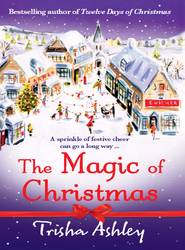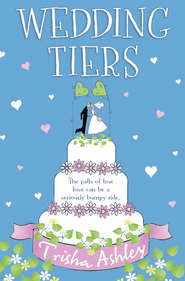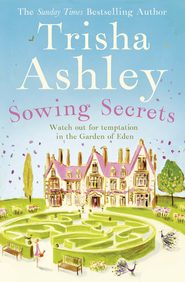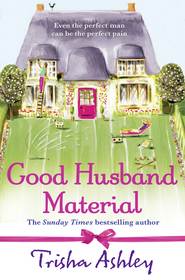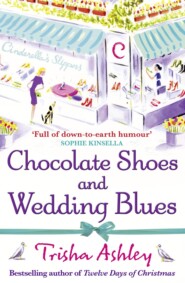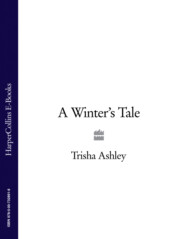По всем вопросам обращайтесь на: info@litportal.ru
(©) 2003-2025.
✖
Finding Mr Rochester
Автор
Год написания книги
2018
Настройки чтения
Размер шрифта
Высота строк
Поля
Finding Mr Rochester
Trisha Ashley
In this fabulous ebook short story Trisha Ashley will whisk you away for a romantic treat on the Yorkshire moors.Plus the first chance to get your hands on some exclusive Trisha Ashley recipes.Budding author and die-hard Bronte fan Eleri Groves decides to escape from her disastrous love life to a remote farm cottage in Yorkshire.Living in the land of the Brontes has got to be better than her life at home and she hopes that she’ll find some inspiration for her next book.But what she doesn’t expect is to find her own Mr Rochester and much more than she bargained for …A warm, witty and romantic short story from Sunday Times top 5 best-selling author Trisha Ashley.
FINDING MR ROCHESTER
TRISHA ASHLEY
Table of Contents
Cover (#u9b059bf2-3a53-5a63-bc19-f9e35acf8ef5)
Title Page (#u897f2ff7-fbcd-5713-b7b2-3d26b7269195)
Finding Mr Rochester (#u698f35c0-da63-5055-bf86-b9107269a05f)
Chapter 1 (#ufebebf2c-86ea-5ed7-83b2-c086766c6c06)
Chapter 2 (#u3f1d5c9a-97f6-52f3-ac70-6d3660b4ac96)
Chapter 3 (#u0c8b6789-7cfc-533d-92b1-7cf788e7ea25)
Chapter 4 (#litres_trial_promo)
Chapter 5 (#litres_trial_promo)
Chapter 6 (#litres_trial_promo)
Chapter 7 (#litres_trial_promo)
Mr Rochester’s Afternoon Tea Recipes (#litres_trial_promo)
Read on for a first look at Trisha’s brand new novel Every Woman For Herself … (#litres_trial_promo)
About the Author (#litres_trial_promo)
By the same author (#litres_trial_promo)
Copyright (#litres_trial_promo)
About the Publisher (#litres_trial_promo)
FINDING MR ROCHESTER (#ulink_2ce222c3-9fa0-5afc-b3d4-a91f114c564e)
1 (#ulink_55f19c33-b750-56fa-b432-3e250111f8f9)
Due to a flat tyre, I’d had no time to look around the auction before the bidding started, but when the auctioneer’s assistant held up a mixed box of items, including a willow-patterned teapot and large serving dish, I took a gamble, because I simply adore blue and white china.
I got it so cheaply that I was worried the dealers knew something I didn’t, like it was cracked or chipped, but I had a quick look while loading it into the car and it seemed perfect.
I can’t say I paid a lot of interest to the other contents of the box until I got it back to my flat, where I discovered I’d become the proud possessor of a random collection of Victoriana, including a blue-tasselled cardboard fan inscribed with biblical quotes of a bracing kind, a pair of small brown leather buttoned boots, a crushed and depressed-looking black velvet hat with crepe streamers, and a large, fat, gilt-edged book bound in maroon leather.
The latter, once I’d ventured beyond endpapers marbled like cheap salami, proved to be completely filled by clear copperplate handwriting and was inscribed on the flyleaf, The Memoirs of Hephzibah Burd-Jonas.
Well, being the author of popular historical romantic novels, I immediately hoped Hephzibah might provide a spark of inspiration for the next, but my hopes were dashed after only a short perusal of her turgid, prissy and pious prose.
A vicar’s daughter, she’d married a missionary and embraced his quest to go out into the world and convert the heathen, whether they liked it or not. Later, on being widowed, she’d thought it her duty to return home and look after her father, busying herself with parish affairs, and from this point, her memoirs plumbed new depths of boring.
I’d begun skimming through quickly to the end, when the mention of the name Charlotte – Charlotte Brontë – brought me up short. I read on with a faster beating heart and a sense of rising excitement, as Hephzibah said she’d recently learned that her old Roe Head schoolfellow had gone to meet her Maker, but hoped she would have long since repented of her intemperate writings and died in a tolerable state of grace!
It emerged that on Mrs Burd-Jonas’ return from Africa, a mutual friend, who had stayed in correspondence with Charlotte, had sent her a copy of Jane Eyre.
‘I cannot tell you how shockingly full of wild notions, intemperate language and a lack of acceptance of God’s designated path through life I found it,’ she wrote. ‘A feeling compounded by my friend’s further confidence that Charlotte once laughingly told her she had drawn inspiration for the appearance of Mr Rochester from a surly, black-haired moorland farmer at a place fittingly called Godesend. And, what was worse, until wintry weather put a stop to such excursions, she had passed by this remote spot so often in the hope of catching a glimpse of him that she suspected he began to misunderstand her interest – and he a married man!’
Then she added, cattily, ‘It was a complete surprise to me that Miss Brontë should have expressed herself in this manner, for I remember little of her at Roe Head, except that she was small, retiring in nature and entirely unremarkable.’
I read this page over and over, hardly able to believe my own eyes. I mean, I’m a huge Brontë fan and my secret passion for Mr Rochester probably explains my poor choice of boyfriends and current single state! Clever, dark, tricky, sarcastic men have not turned out to be the stuff that dreams are made of. Jane Eyre only pulled it off after the author’s pen had softened up Mr Rochester by maiming him while he was nobly engaged in trying to rescue his mad wife from her burning attic.
Of course, after this discovery I searched the rest of the manuscript with a fine-tooth comb, but that brief passage was the only interesting thing in the whole memoirs. But it was enough – more than enough – and what plot ideas it was suddenly sparking in my mind!
For a few days I hugged the secret to myself, doing a little research on Hephzibah – though there didn’t seem to be much that she hadn’t included in her copious memoirs – and outlining a novel I proposed calling Finding Mr Rochester – a kind of Brief Encounter, but without trains.
When I finally revealed all to my agent, Senga McWhirter, she immediately grasped the importance of my find and the huge media potential for publicising the new novel. Both she and my editor were adamant that the memoir must be kept under wraps until closer to publication day, for maximum effect.
So I settled down to write the book, taking some liberties to make it a doomed love affair between Charlotte and the farmer, though I couldn’t immediately think how I could possibly end it on a high note!
I was so inspired that I rushed off a first draft before even researching the background, so it was some weeks later before I thought to look online for any mention of a Godesend Farm near Haworth – but when I did, bingo! There it was, high up on the moors and nearer to Upvale than Haworth – and what’s more, it had a holiday cottage to let.
The picture showed an unappealing, low stone building resembling a large pigsty, looming out of a fog, and it promised a no-frills base for nature lovers and hikers to explore the nearby countryside. There was a tearoom at the farm in season, though it didn’t specify which season, and a pub within walking distance.
I rang the number and a woman with a deep voice said the cottage was free for the first week of September and then would be shut up till the spring, so I booked it, after checking that I could take my dog with me.
‘So long as it’s not let loose to worry the sheep,’ she agreed.
I assured her that Missy, a small, fluffy white bundle of indeterminate parentage, was more likely to run in the opposite direction.
‘The weather’s none too good this time of year,’ she warned me, though only after making the booking.
‘That’s all right, I just want to soak up the atmosphere.’
‘We’ve got plenty of that,’ she said dryly, then put the phone down.
2 (#ulink_37e736e7-426b-5bd0-a218-8175e6dac164)
My first visit to Godesend Farm passed by in a mist – literally. A fuzzy, thick grey blanket of the stuff shrouded the moors and it was by sheer good luck that I found the turn to the farm from the road, next to a weathered and dismally flapping sign that read:
Afternoon teas 100 yards.
Hikers
Trisha Ashley
In this fabulous ebook short story Trisha Ashley will whisk you away for a romantic treat on the Yorkshire moors.Plus the first chance to get your hands on some exclusive Trisha Ashley recipes.Budding author and die-hard Bronte fan Eleri Groves decides to escape from her disastrous love life to a remote farm cottage in Yorkshire.Living in the land of the Brontes has got to be better than her life at home and she hopes that she’ll find some inspiration for her next book.But what she doesn’t expect is to find her own Mr Rochester and much more than she bargained for …A warm, witty and romantic short story from Sunday Times top 5 best-selling author Trisha Ashley.
FINDING MR ROCHESTER
TRISHA ASHLEY
Table of Contents
Cover (#u9b059bf2-3a53-5a63-bc19-f9e35acf8ef5)
Title Page (#u897f2ff7-fbcd-5713-b7b2-3d26b7269195)
Finding Mr Rochester (#u698f35c0-da63-5055-bf86-b9107269a05f)
Chapter 1 (#ufebebf2c-86ea-5ed7-83b2-c086766c6c06)
Chapter 2 (#u3f1d5c9a-97f6-52f3-ac70-6d3660b4ac96)
Chapter 3 (#u0c8b6789-7cfc-533d-92b1-7cf788e7ea25)
Chapter 4 (#litres_trial_promo)
Chapter 5 (#litres_trial_promo)
Chapter 6 (#litres_trial_promo)
Chapter 7 (#litres_trial_promo)
Mr Rochester’s Afternoon Tea Recipes (#litres_trial_promo)
Read on for a first look at Trisha’s brand new novel Every Woman For Herself … (#litres_trial_promo)
About the Author (#litres_trial_promo)
By the same author (#litres_trial_promo)
Copyright (#litres_trial_promo)
About the Publisher (#litres_trial_promo)
FINDING MR ROCHESTER (#ulink_2ce222c3-9fa0-5afc-b3d4-a91f114c564e)
1 (#ulink_55f19c33-b750-56fa-b432-3e250111f8f9)
Due to a flat tyre, I’d had no time to look around the auction before the bidding started, but when the auctioneer’s assistant held up a mixed box of items, including a willow-patterned teapot and large serving dish, I took a gamble, because I simply adore blue and white china.
I got it so cheaply that I was worried the dealers knew something I didn’t, like it was cracked or chipped, but I had a quick look while loading it into the car and it seemed perfect.
I can’t say I paid a lot of interest to the other contents of the box until I got it back to my flat, where I discovered I’d become the proud possessor of a random collection of Victoriana, including a blue-tasselled cardboard fan inscribed with biblical quotes of a bracing kind, a pair of small brown leather buttoned boots, a crushed and depressed-looking black velvet hat with crepe streamers, and a large, fat, gilt-edged book bound in maroon leather.
The latter, once I’d ventured beyond endpapers marbled like cheap salami, proved to be completely filled by clear copperplate handwriting and was inscribed on the flyleaf, The Memoirs of Hephzibah Burd-Jonas.
Well, being the author of popular historical romantic novels, I immediately hoped Hephzibah might provide a spark of inspiration for the next, but my hopes were dashed after only a short perusal of her turgid, prissy and pious prose.
A vicar’s daughter, she’d married a missionary and embraced his quest to go out into the world and convert the heathen, whether they liked it or not. Later, on being widowed, she’d thought it her duty to return home and look after her father, busying herself with parish affairs, and from this point, her memoirs plumbed new depths of boring.
I’d begun skimming through quickly to the end, when the mention of the name Charlotte – Charlotte Brontë – brought me up short. I read on with a faster beating heart and a sense of rising excitement, as Hephzibah said she’d recently learned that her old Roe Head schoolfellow had gone to meet her Maker, but hoped she would have long since repented of her intemperate writings and died in a tolerable state of grace!
It emerged that on Mrs Burd-Jonas’ return from Africa, a mutual friend, who had stayed in correspondence with Charlotte, had sent her a copy of Jane Eyre.
‘I cannot tell you how shockingly full of wild notions, intemperate language and a lack of acceptance of God’s designated path through life I found it,’ she wrote. ‘A feeling compounded by my friend’s further confidence that Charlotte once laughingly told her she had drawn inspiration for the appearance of Mr Rochester from a surly, black-haired moorland farmer at a place fittingly called Godesend. And, what was worse, until wintry weather put a stop to such excursions, she had passed by this remote spot so often in the hope of catching a glimpse of him that she suspected he began to misunderstand her interest – and he a married man!’
Then she added, cattily, ‘It was a complete surprise to me that Miss Brontë should have expressed herself in this manner, for I remember little of her at Roe Head, except that she was small, retiring in nature and entirely unremarkable.’
I read this page over and over, hardly able to believe my own eyes. I mean, I’m a huge Brontë fan and my secret passion for Mr Rochester probably explains my poor choice of boyfriends and current single state! Clever, dark, tricky, sarcastic men have not turned out to be the stuff that dreams are made of. Jane Eyre only pulled it off after the author’s pen had softened up Mr Rochester by maiming him while he was nobly engaged in trying to rescue his mad wife from her burning attic.
Of course, after this discovery I searched the rest of the manuscript with a fine-tooth comb, but that brief passage was the only interesting thing in the whole memoirs. But it was enough – more than enough – and what plot ideas it was suddenly sparking in my mind!
For a few days I hugged the secret to myself, doing a little research on Hephzibah – though there didn’t seem to be much that she hadn’t included in her copious memoirs – and outlining a novel I proposed calling Finding Mr Rochester – a kind of Brief Encounter, but without trains.
When I finally revealed all to my agent, Senga McWhirter, she immediately grasped the importance of my find and the huge media potential for publicising the new novel. Both she and my editor were adamant that the memoir must be kept under wraps until closer to publication day, for maximum effect.
So I settled down to write the book, taking some liberties to make it a doomed love affair between Charlotte and the farmer, though I couldn’t immediately think how I could possibly end it on a high note!
I was so inspired that I rushed off a first draft before even researching the background, so it was some weeks later before I thought to look online for any mention of a Godesend Farm near Haworth – but when I did, bingo! There it was, high up on the moors and nearer to Upvale than Haworth – and what’s more, it had a holiday cottage to let.
The picture showed an unappealing, low stone building resembling a large pigsty, looming out of a fog, and it promised a no-frills base for nature lovers and hikers to explore the nearby countryside. There was a tearoom at the farm in season, though it didn’t specify which season, and a pub within walking distance.
I rang the number and a woman with a deep voice said the cottage was free for the first week of September and then would be shut up till the spring, so I booked it, after checking that I could take my dog with me.
‘So long as it’s not let loose to worry the sheep,’ she agreed.
I assured her that Missy, a small, fluffy white bundle of indeterminate parentage, was more likely to run in the opposite direction.
‘The weather’s none too good this time of year,’ she warned me, though only after making the booking.
‘That’s all right, I just want to soak up the atmosphere.’
‘We’ve got plenty of that,’ she said dryly, then put the phone down.
2 (#ulink_37e736e7-426b-5bd0-a218-8175e6dac164)
My first visit to Godesend Farm passed by in a mist – literally. A fuzzy, thick grey blanket of the stuff shrouded the moors and it was by sheer good luck that I found the turn to the farm from the road, next to a weathered and dismally flapping sign that read:
Afternoon teas 100 yards.
Hikers






